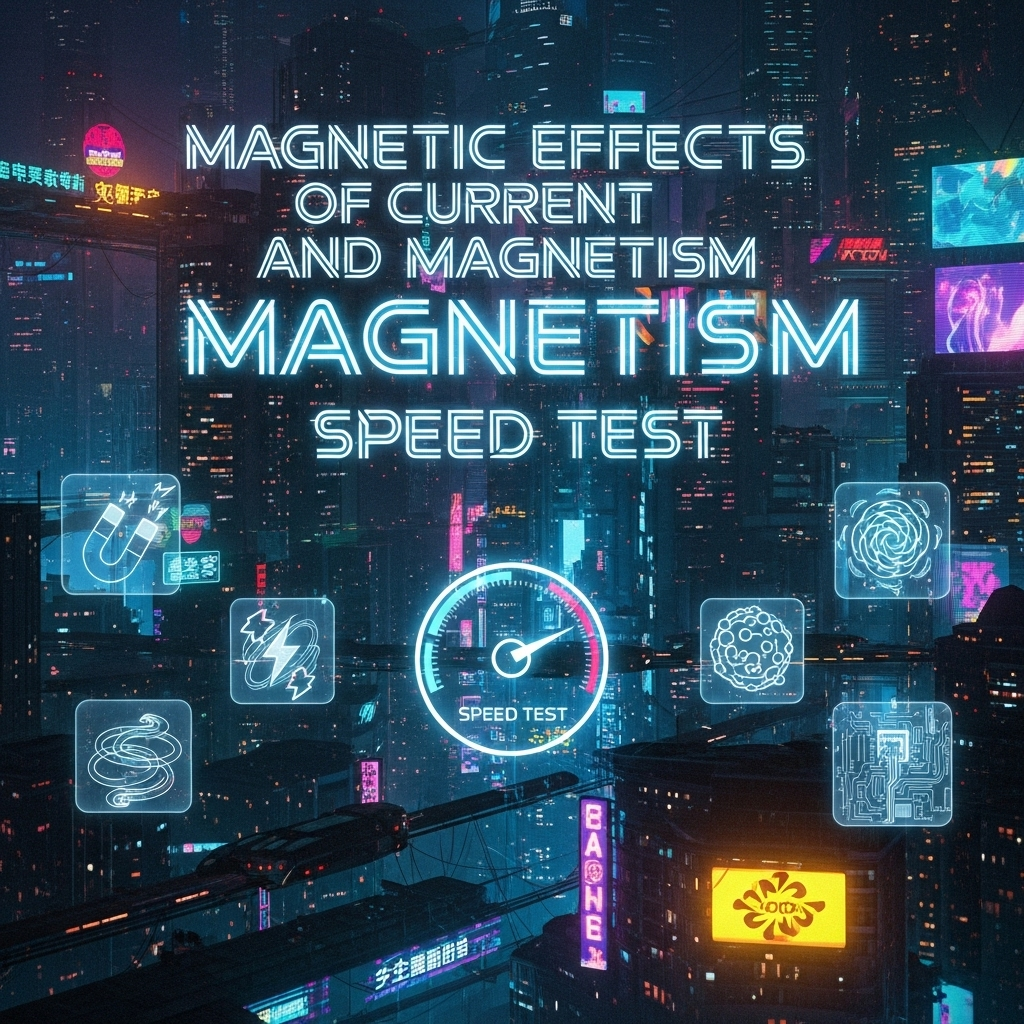Magnetic Effects of Current and Magnetism Mastery – Interactive Quiz & Cheatsheet
Boost your understanding of Magnetic Effects of Current and Magnetism with this engaging quiz and quick-reference guide tailored for exam success
Updated: 6 months ago
Categories: Mini Game, Physics, Class 12, Magnetism

Magnetic Effects of Current & Magnetism Cheatsheet
Key Concepts & Formulas
- Biot-Savart Law: \( d\vec{B} = \frac{\mu_0}{4\pi} \frac{I (d\vec{l} \times \hat{r})}{r^2} \)
- Magnetic Field of a Straight Wire: \( B = \frac{\mu_0 I}{2\pi r} \)
- Magnetic Field at Center of a Loop: \( B = \frac{\mu_0 I}{2R} \)
- Ampere's Circuital Law: \( \oint \vec{B} \cdot d\vec{l} = \mu_0 I_{\text{enc}} \)
- Lorentz Force: \( \vec{F} = q(\vec{E} + \vec{v} \times \vec{B}) \)
- Force on a Current-Carrying Wire: \( \vec{F} = I(\vec{l} \times \vec{B}) \)
- Magnetic Dipole Moment: \( \vec{\mu} = I\vec{A} \)
- Torque on a Dipole: \( \vec{\tau} = \vec{\mu} \times \vec{B} \)
- Magnetic Flux: \( \Phi_B = \int \vec{B} \cdot d\vec{A} \)
- Solenoid Field: \( B = \mu_0 n I \)
Quick Reference Table
| Concept | Formula | Explanation |
|---|---|---|
| Biot-Savart Law | \( d\vec{B} = \frac{\mu_0}{4\pi} \frac{I (d\vec{l} \times \hat{r})}{r^2} \) | Finds magnetic field from a current element. |
| Force on Charge | \( \vec{F} = q(\vec{v} \times \vec{B}) \) | Force on a moving charge in a magnetic field. |
| Ampere's Law | \( \oint \vec{B} \cdot d\vec{l} = \mu_0 I_{\text{enc}} \) | Relates magnetic field around a closed loop to the current passing through it. |
| Torque on Loop | \( \vec{\tau} = \vec{\mu} \times \vec{B} \) | Torque experienced by a current loop in a magnetic field. |
| Cyclotron Frequency | \( \omega = \frac{qB}{m} \) | Angular frequency of a charged particle's circular motion. |
| Magnetic Field of Toroid | \( B = \frac{\mu_0 N I}{2\pi r} \) | Magnetic field inside a toroid. |
Tips for Solving Problems
Direction is Key: Use the right-hand thumb rule to find the direction of magnetic fields and forces.
Symmetry: For Ampere's Law, choose a symmetric Amperian loop to simplify the integral.
Vector Cross Product: Remember that the force \( \vec{F} \) is always perpendicular to both \( \vec{v} \) and \( \vec{B} \).
Lorentz Force: It is the sum of electric and magnetic forces on a charged particle.
Units: Always check your units. Magnetic field (B) is measured in Tesla (T).
Magnetic Effects Quick Tips
- Right-Hand Rule: Point your thumb in the direction of current (I), and your fingers curl in the direction of the magnetic field (B).
- Force on a Wire: For \( \vec{F} = I(\vec{l} \times \vec{B}) \), use the right-hand palm rule to find force direction.
- Solenoid vs. Toroid: Solenoid's field is uniform and parallel to its axis, while a toroid's field is contained within its core.
- Cyclotron Motion: A charged particle moves in a circular path in a uniform magnetic field.
- Magnetic Flux: The amount of magnetic field lines passing through a given area. Maximum when B is parallel to the area vector.
Magnetic Effects Speed Quiz
Test your speed with 5 magnetic effects questions! You have 30 seconds per question.
Question: 1/5
Time left: 30s
Quiz Complete!
Your Score: 0/5

Group Discussions
No forum posts available.


